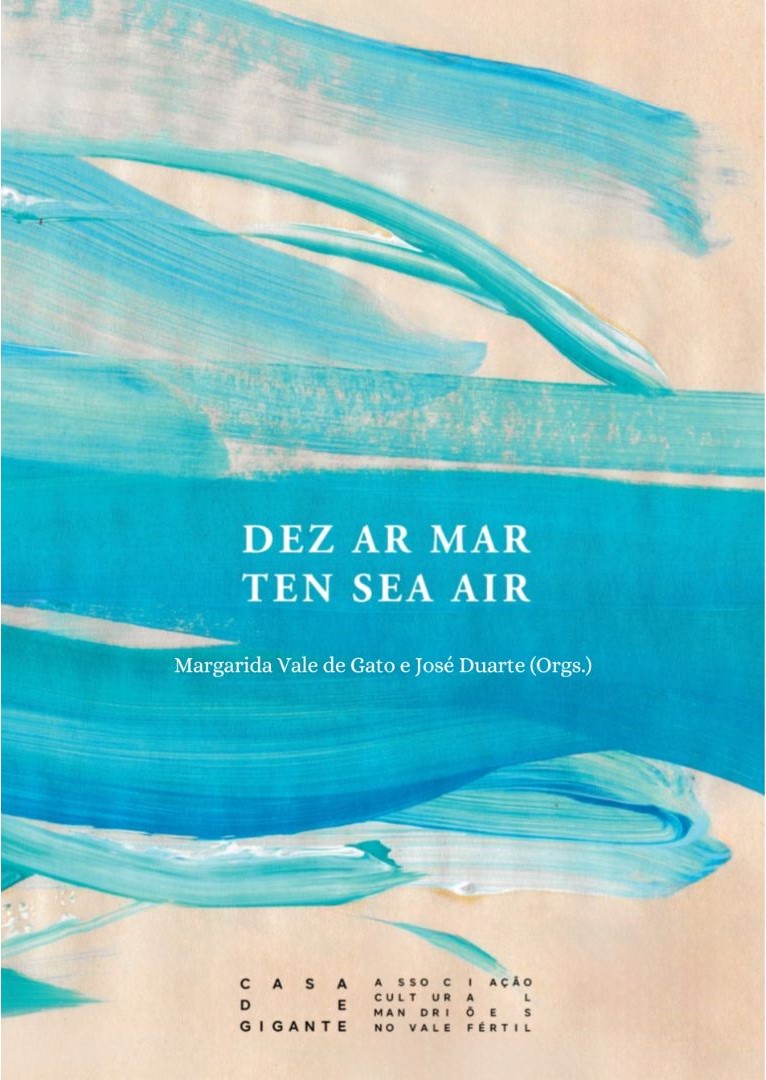Climate and Environment
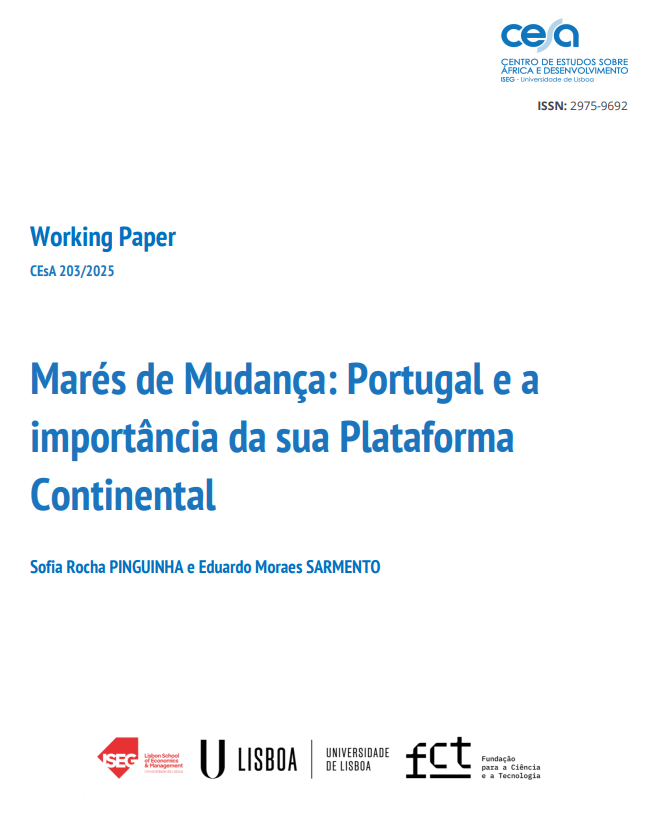
Working Paper 203/2025: Marés de Mudança: Portugal e a importância da sua Plataforma Continental
Abstract:
Portugal, known for its historic maritime traditions, is currently immersed in a strategic ambition regarding the expansion of its continental shelf driven by geopolitical, economic and environmental factors, placing the country before a dynamic maritime scenario full of challenges and opportunities. The rise of the blue economy, synonymous with a sustainable economy, redefines the indispensability of the ocean and its centrality in the balance of building the sustainable development that is sought globally (Cristas, 2022). Using a qualitative methodology, the aim is to reflect on the main benefits that Portugal can obtain from the possible approval of the expansion of its continental shelf, by the United Nations Organisation (UNO). The future, according to the National Strategy for the Sea 2021-2030 (República Portuguesa, 2021), should involve defining a strategy, based on a system of alliances, that will allow Portugal to move forward with the sustainable exploitation of the marine resources (Seguro, 2022).
Cite this Working Paper:
Pinguinha, Sofia Rocha and Eduardo Moraes Sarmento (2025). “Marés de Mudança: Portugal e a importância da sua Plataforma Continental”. CEsA/CSG – Documentos de trabalho nº 203/2025
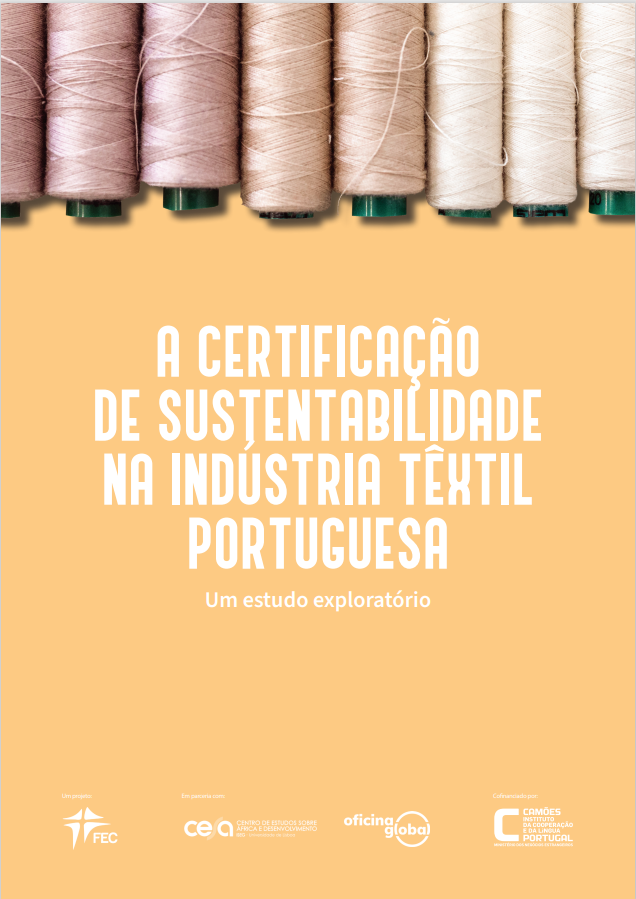
A certificação de sustentabilidade na Indústria Têxtil Portuguesa: um estudo exploratório
Abstract:
This study analyzes sustainability certification in the Portuguese textile industry. The main objective is to map the current landscape of sustainable practices adopted by this crucial sector of the Portuguese economy, evaluating the implications, challenges, and benefits of certification in the contemporary economic and environmental context. We aim to understand how sustainability certifications can serve as a strategic tool to boost the competitiveness of Portuguese companies in the global market, responding to the growing demand for ethical and environmentally conscious products.
The methodology employed in this study involves a review of the existing literature on sustainability in the textile industry. Essentially, it is a hybrid and comparative analysis, utilizing the complete universe of certified Portuguese textile companies. While this focused approach does not answer all questions, it allows this study to take a small step towards research committed to supporting companies that, despite clear risks and costs, choose to invest in sustainability. It also addresses the societal pressure that can and should be exerted on legislators to implement stronger regulatory frameworks and on companies that decide not to invest in sustainability.
This is a small step we hope will lead to further research efforts. We offer a perspective on the role of sustainability certification as a competitive differentiator for the Portuguese textile industry. The study emphasizes the growing importance of sustainability as a selection criterion for consumers and international business partners, reinforcing the need for Portuguese companies to continue investing in sustainable practices and obtaining certifications that validate their efforts. The study also presents and discusses recommendations for future policies and strategies, aiming to strengthen Portugal’s position as a leader in sustainable textile production on the global stage.
Cite this ebook:
Bernardo, Luís Pais (2024). A certificação de sustentabilidade na Indústria Têxtil Portuguesa : um estudo exploratório. Lisboa: Oficina Global.
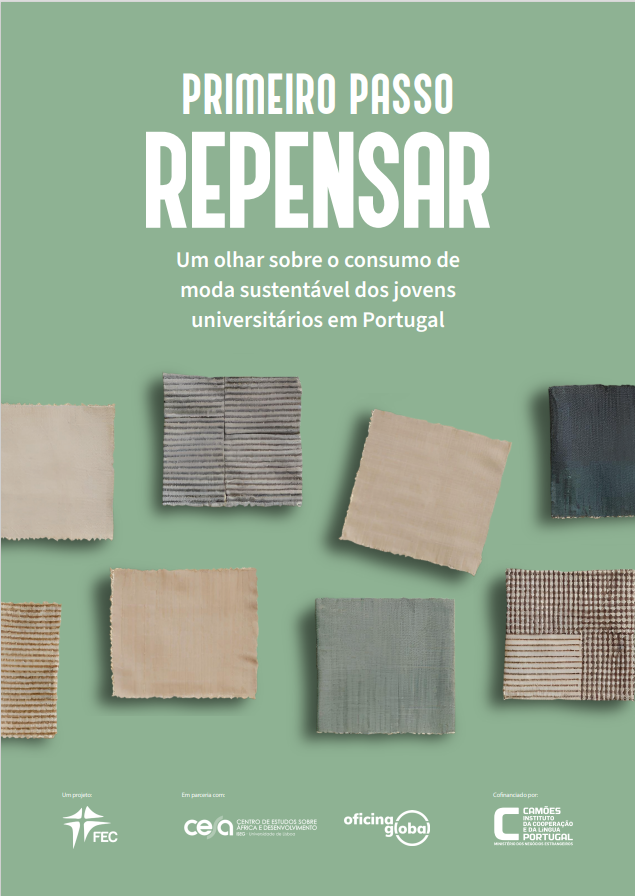
Primeiro Passo Repensar: Um olhar sobre o consumo de moda sustentável dos jovens universitários em Portugal
Abstract:
Sustainable fashion consumption involves conscious choices in purchasing, using/maintaining, and disposing of each clothing item. Therefore, it is important to Rethink, Reject, Reduce, Repair, Reuse, and Recycle. This study aimed to understand the behaviors and environmental awareness of university students living in Portugal during the three main phases of fashion consumption. An online questionnaire survey was conducted among 271 university students aged 18 to 26. The survey was open for responses from June 15 to July 24, 2023.
Cite this ebook:
Silva, Ana Luísa e Renata Assis (2024). Primeiro passo repensar: um olhar sobre o consumo de moda sustentável dos jovens universitários em Portugal. Lisboa: FEC | Fundação Fé e Cooperação e CEsA/ISEG-UL.

Algodão, uma fibra global
Abstract:
Cotton doesn’t lie. This well-known idiom in Portugal highlights how the most important natural fiber — both historically and commercially — has woven itself into our lives. Yet, while cotton doesn’t deceive, it does conceal. It’s more than just a fiber; it’s an entire global industry. It shapes production and consumption patterns, directly impacting the lives of millions worldwide. Cotton influences the fate of soils and water sources and significantly affects the environment. It encompasses agriculture, fashion, and high technology. Cotton has a complex and often troubling history: it can be sweet, but it’s also bitter. Its soft touch belies the complexity of its life cycle, which spans from cotton fields in Burkina Faso to garment factories in Bangladesh, fashion runways in Milan, and algorithms in New York. This distribution isn’t arbitrary: the value gap —evident in the income disparity between a field worker in Burkina Faso, a factory manager in Bangladesh, and a top designer in Milan — illustrates global inequalities. Cotton connects these diverse landscapes and activities. This briefing is for anyone who wants to understand the fashion they wear and the fibers they choose. It’s also for decision-makers regulating cotton production and consumption. Responsible consumption is a key step in altering economic structures, but it’s rarely enough on its own. Our aim is clear: meaningful action requires clarity, knowledge, and information.
Cite this ebook:
Bernardo, Luís Pais (2023). Algodão, uma fibra global. Lisboa: FEC | Fundação Fé e Cooperação.
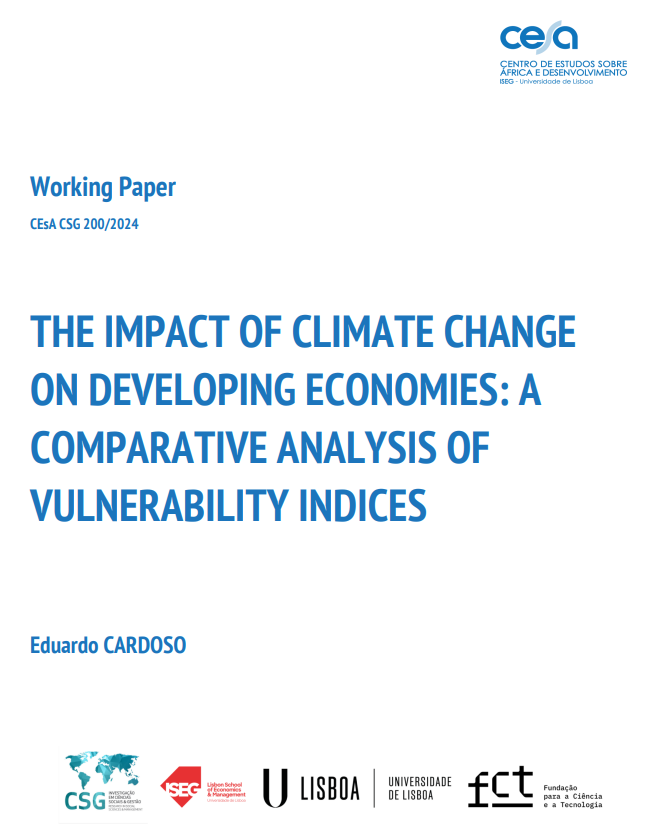
Working Paper 200/2024: The Impact of Climate Change on Developing Economies: A comparative analysis of vulnerability indices
Abstract:
In order to make informed decisions on climate finance and policies, there is an increasing need to develop an index to assess countries’ vulnerability to climate change. However, differing concepts and methodologies have led to varied views on which countries are most vulnerable and deserve more international financial support. This Working Paper examines whether key indices in climate science consistently classify countries’ vulnerability to climate disruption. It begins by reviewing literature on the impact of climate change on developing countries, followed by a comparative analysis of the EVI, ND-GAIN, INFORM, and WRI indices from 2014 to 2020. The findings indicate that while these indices are valuable for understanding and monitoring vulnerability, their differing components lead to divergent results. This research underscores the importance of a holistic approach to vulnerability assessment and calls for informed selection of indices based on specific objectives and contexts.
Cite this Working Paper:
Cardoso, Eduardo (2024). “The Impact of Climate Change on Developing Economies: A comparative analysis of vulnerability indices”. CEsA/CSG – Documentos de Trabalho nº 200/2024.
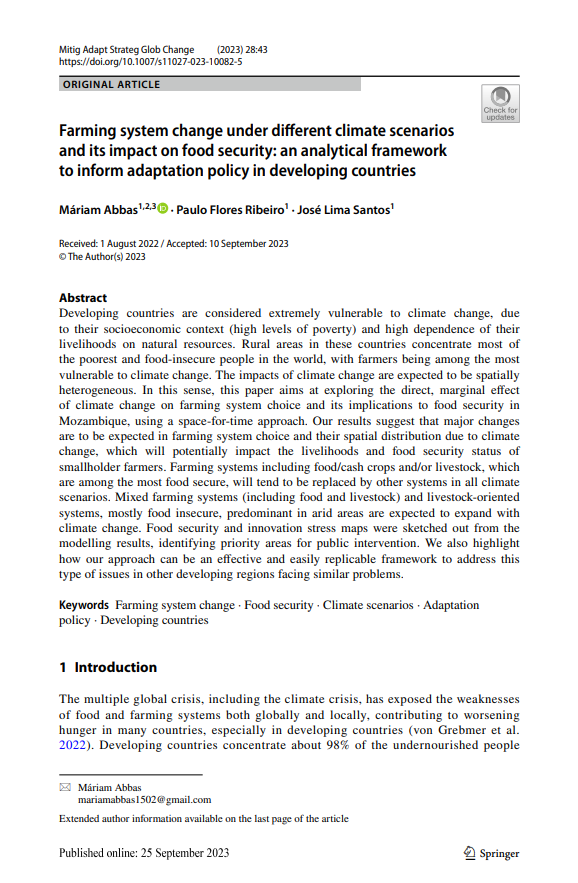
Farming System Change Under Different Climate Scenarios and its Impact on Food Security: an analytical framework to inform adaptation policy in developing countries
Abstract:
Developing countries are considered extremely vulnerable to climate change, due to their socioeconomic context (high levels of poverty) and high dependence of their livelihoods on natural resources. Rural areas in these countries concentrate most of the poorest and food-insecure people in the world, with farmers being among the most vulnerable to climate change. The impacts of climate change are expected to be spatially heterogeneous. In this sense, this paper aims at exploring the direct, marginal effect of climate change on farming system choice and its implications to food security in Mozambique, using a space-for-time approach. Our results suggest that major changes are to be expected in farming system choice and their spatial distribution due to climate change, which will potentially impact the livelihoods and food security status of smallholder farmers. Farming systems including food/cash crops and/or livestock, which are among the most food secure, will tend to be replaced by other systems in all climate scenarios. Mixed farming systems (including food and livestock) and livestock-oriented systems, mostly food insecure, predominant in arid areas are expected to expand with climate change. Food security and innovation stress maps were sketched out from the modelling results, identifying priority areas for public intervention. We also highlight how our approach can be an effective and easily replicable framework to address this type of issues in other developing regions facing similar problems.
Quotation:
Abbas, M., Ribeiro, P.F. & Santos, J.L. Farming System Change Under Different Climate Scenarios and its Impact on Food Security: an analytical framework to inform adaptation policy in developing countries. Mitig Adapt Strateg Glob Change 28, 43 (2023). https://doi.org/10.1007/s11027-023-10082-5
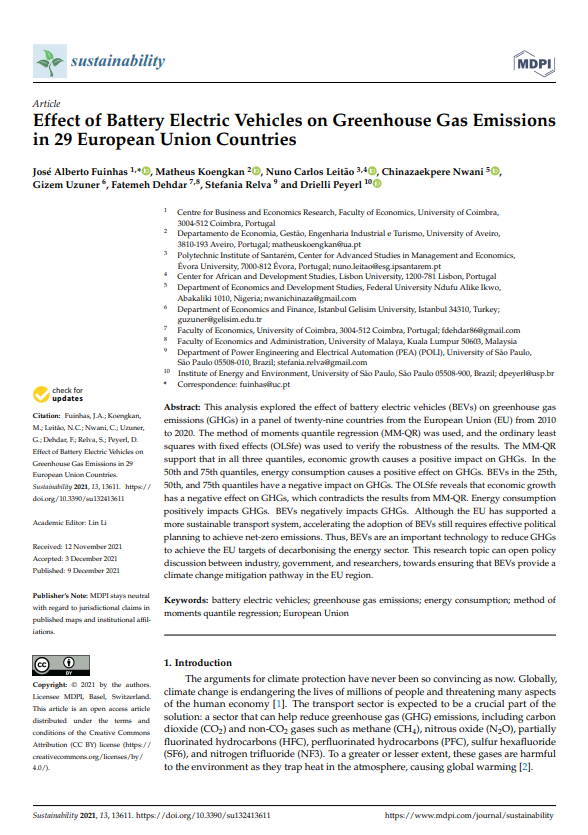
Effect of Battery Electric Vehicles on Greenhouse Gas Emissions in 29 European Union Countries
Abstract:
Effect of Battery Electric Vehicles on Greenhouse Gas Emissions in 29 European Union Countries explored the effect of battery electric vehicles (BEVs) on greenhouse gas emissions (GHGs) in a panel of twenty-nine countries from the European Union (EU) from 2010 to 2020. The method of moments quantile regression (MM-QR) was used, and the ordinary least squares with fixed effects (OLSfe) was used to verify the robustness of the results. The MM-QR support that in all three quantiles, economic growth causes a positive impact on GHGs. In the 50th and 75th quantiles, energy consumption causes a positive effect on GHGs. BEVs in the 25th, 50th, and 75th quantiles have a negative impact on GHGs. The OLSfe reveals that economic growth has a negative effect on GHGs, which contradicts the results from MM-QR. Energy consumption positively impacts GHGs. BEVs negatively impacts GHGs. Although the EU has supported a more sustainable transport system, accelerating the adoption of BEVs still requires effective political planning to achieve net-zero emissions. Thus, BEVs are an important technology to reduce GHGs to achieve the EU targets of decarbonising the energy sector. This research topic can open policy discussion between industry, government, and researchers, towards ensuring that BEVs provide a climate change mitigation pathway in the EU region.
Citação:
Fuinhas, J.A., Koengkan, M., Leitão, N.C., Nwani, C., Uzuner, G., Dehdar, F., Relva, S., Peyerl, D. (2021). Effect of Battery Electric Vehicles on Greenhouse Gas Emissions in 29 European Union Countries. Sustainability, 13 (24), 13611. https://doi.org/10.3390/su132413611
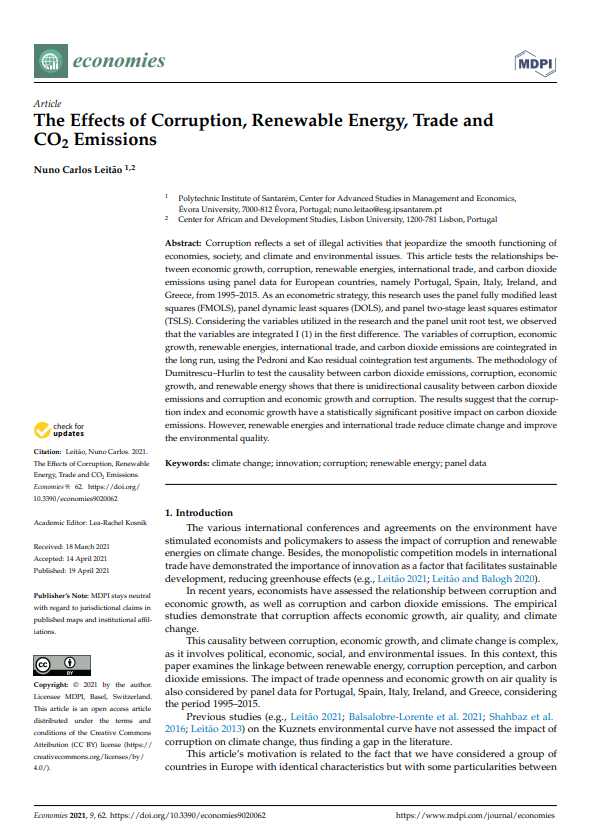
The Effects of Corruption, Renewable Energy, Trade and CO2 Emissions
Abstract:
Corruption reflects a set of illegal activities that jeopardize the smooth functioning of economies, society, and climate and environmental issues. The Effects of Corruption, Renewable Energy, Trade and CO2 Emissions tests the relationships between economic growth, corruption, renewable energies, international trade, and carbon dioxide emissions using panel data for European countries, namely Portugal, Spain, Italy, Ireland, and Greece, from 1995–2015. As an econometric strategy, this research uses the panel fully modified least squares (FMOLS), panel dynamic least squares (DOLS), and panel two-stage least squares estimator (TSLS). Considering the variables utilized in the research and the panel unit root test, we observed that the variables are integrated I (1) in the first difference. The variables of corruption, economic growth, renewable energies, international trade, and carbon dioxide emissions are cointegrated in the long run, using the Pedroni and Kao residual cointegration test arguments. The methodology of Dumitrescu–Hurlin to test the causality between carbon dioxide emissions, corruption, economic growth, and renewable energy shows that there is unidirectional causality between carbon dioxide emissions and corruption and economic growth and corruption. The results suggest that the corruption index and economic growth have a statistically significant positive impact on carbon dioxide emissions. However, renewable energies and international trade reduce climate change and improve the environmental quality.
Quotation:
Leitão, N.C. (2021b). The Effects of Corruption, Renewable Energy, Trade and CO2 Emissions (MDPI) 2021, 9 (2), 62. https://doi.org/10.3390/economies9020062
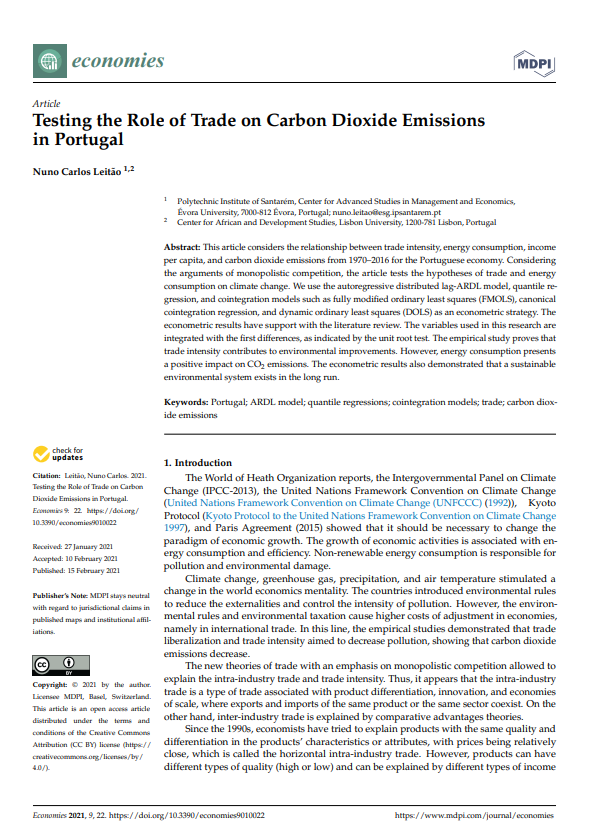
Testing the Role of Trade on Carbon Dioxide Emissions in Portugal
Abstract:
Testing the Role of Trade on Carbon Dioxide Emissions in Portugal considers the relationship between trade intensity, energy consumption, income per capita, and carbon dioxide emissions from 1970–2016 for the Portuguese economy. Considering the arguments of monopolistic competition, the article tests the hypotheses of trade and energy consumption on climate change. We use the autoregressive distributed lag-ARDL model, quantile regression, and cointegration models such as fully modified ordinary least squares (FMOLS), canonical cointegration regression, and dynamic ordinary least squares (DOLS) as an econometric strategy. The econometric results have support with the literature review. The variables used in this research are integrated with the first differences, as indicated by the unit root test. The empirical study proves that trade intensity contributes to environmental improvements. However, energy consumption presents a positive impact on CO2 emissions. The econometric results also demonstrated that a sustainable environmental system exists in the long run. This paper evaluates the theoretical and empirical studies on the effects of trade on carbon dioxide emissions. The theoretical arguments of monopolistic competition models and the relationship between trade intensity and pollution emissions are evaluated, allowing justifying this empirical study’s results. The econometric results show that trade intensity contributes to improving the environment, both in the short and long term, justifying the importance of environmental regulation.
Quotation:
Leitão, N.C. (2021a). Testing the Role of Trade on Carbon Dioxide Emissions in Portugal. Economies (MDPI) 2021,9 (1), 22. https://doi.org/10.3390/economies9010022
